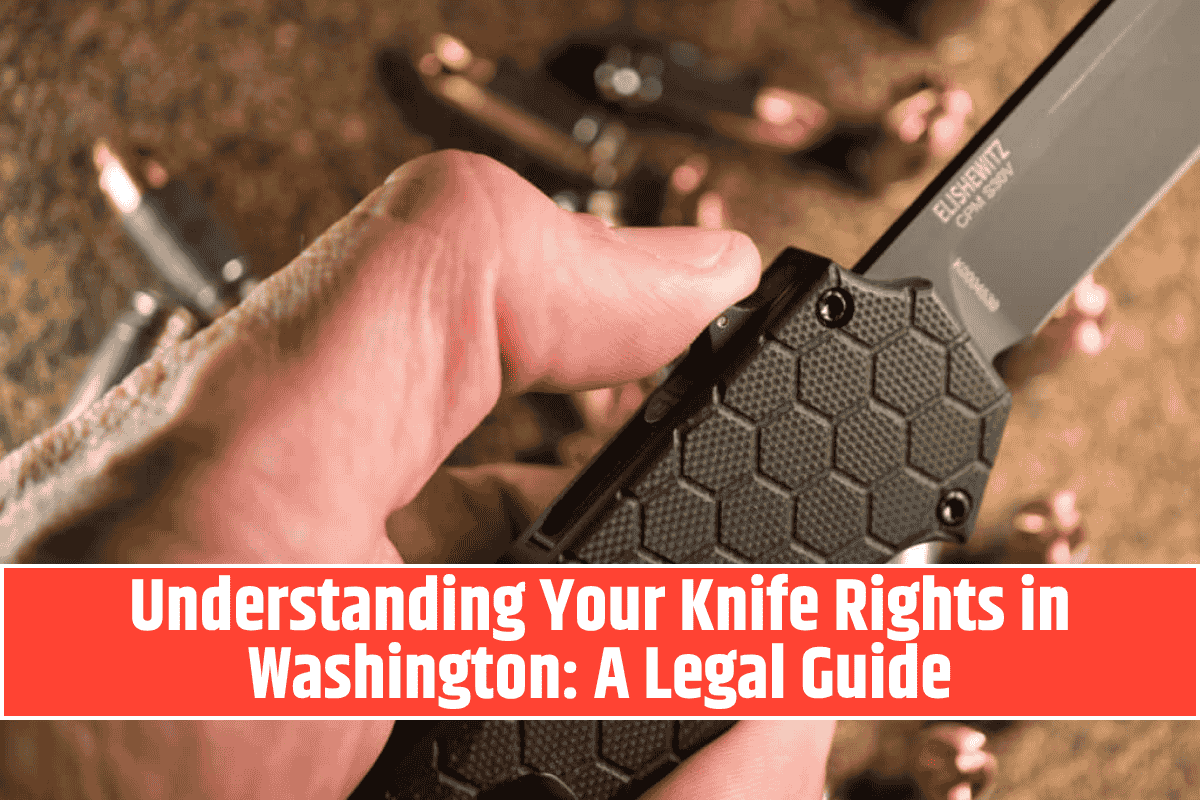Whether you carry a knife for work, outdoor activities, or personal safety, knowing the knife laws in Washington State is important. These laws can be confusing, especially since rules vary depending on the type of knife, how it’s carried, and where you are.
This easy-to-understand guide will help you learn what’s allowed, what’s not, and how to stay safe and legal while carrying a knife in Washington.
Overview of Knife Laws in Washington
In Washington, most common knives are legal, but the way you carry and use them matters more than the knife itself. You’re allowed to own folding knives, pocket knives, and even larger blades like bowie knives or daggers. However, spring-loaded knives, also known as switchblades, are not legal.
Also illegal are butterfly knives (balisongs), gravity knives, and knives that open automatically by flicking or spinning. Laws often focus on whether your knife is being carried for a lawful reason or with harmful intent.
Open Carry vs. Concealed Carry
Open Carry
You’re generally allowed to openly carry legal knives in Washington. However, you can get into trouble if you display the knife in a threatening way or if it causes fear among others—especially in cities like Seattle that may have stricter rules.
Concealed Carry
Concealing a knife with a blade longer than 3.5 inches is mostly not allowed, unless you’re doing something legal like hunting or fishing. People using knives for jobs like carpentry or food preparation are often given exceptions.
Legal Types of Knives You Can Own or Carry
Washington allows the following knives for legal open carry:
Bowie knives
Dirks
Daggers
Stilettos
But always be cautious about how and where you carry them, especially in public spaces.
Age Rules for Knife Possession
Washington law doesn’t set a specific age limit for buying or owning a knife. However, minors under 18 can’t carry knives considered “dangerous weapons” without adult supervision. Some cities or schools have stricter rules, especially when it comes to public places or campuses.
Where Knives Are Not Allowed
Knives are banned in several places across the state, such as:
Public and private schools
Government buildings
Courtrooms
Law enforcement facilities
Airports
Federal properties
Concerts, stadiums, and similar public events
Breaking these rules can lead to serious penalties, so always check posted signs and be aware of local laws.
Criminal Use of Knives
Washington takes knife crimes seriously. Using a knife to threaten, scare, or harm others can lead to felony charges, including assault with a deadly weapon. Even just carrying a knife in a way that causes fear in public could be considered illegal.
Special Cases and Legal Exceptions
Hunting and Camping
If you’re hunting or camping, you’re allowed to carry larger knives as long as you’re using them for those activities. But still, you must act responsibly and follow local rules.
Self-Defense
Washington law allows you to use a knife in self-defense if you truly believe you’re in danger. But the force used must be reasonable and necessary. If you go too far, you could still face charges.
Antique or Collectible Knives
If you collect knives for display or historical interest, you’re usually safe. But don’t bring them to public places or schools. Treat them like any other weapon under the law.
Blade Length and Local Rules
Some cities like Seattle, Tacoma, and Vancouver are strict about blade length. Carrying a knife with a blade longer than 3.5 inches, even openly, may be banned in public spaces. Always measure your blade and research city-specific laws before carrying.
Folding vs. Fixed-Blade Knives
Folding knives (blades that fold into the handle) are generally seen as safer and more legal for everyday carry. Fixed-blade knives (blades that don’t fold) are often considered more dangerous and face more restrictions. Fast-opening knives that blur the line can lead to legal confusion, so use them carefully.
Key Legal Cases in Washington
State v. Byrd – Showed how important clear jury instructions are when someone is charged with assault using a knife. Byrd’s conviction was overturned because the jury wasn’t properly guided.
City of Seattle v. Evans – Evans was arrested for carrying a paring knife, but the court said the knife didn’t count as a protected weapon under the Constitution. The law stood, and Evans lost the case.
State v. Myles – Myles was found with a knife during a conflict, but the court overturned her conviction due to unclear evidence about whether she was trying to hide the weapon.
These cases highlight how legal outcomes can depend on small details, and why it’s smart to understand and follow knife laws clearly.
Knife laws in Washington can be tricky, but if you stick to legal knives, carry them responsibly, and stay away from restricted places, you’ll usually be fine. Avoid automatic knives, understand open and concealed carry rules, and always check your local laws, especially in cities with stricter rules.
Being informed can protect your rights and keep you out of trouble.












